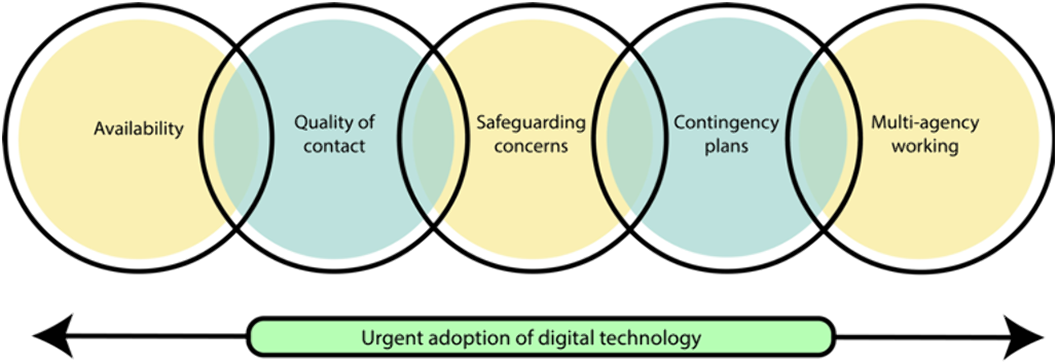No CrossRef data available.
Published online by Cambridge University Press: 13 August 2021
Despite the availability of remote consolation and the evidence for its effectiveness, its adoption has been relatively limited (Hashiguchi, 2020). In light of COVID social distancing measures, there was an immediate requirement to adopt this technology into routine practice.
The objective of this evaluation was to examine clinicians’ experiences of the urgent adoption of digital technology in a NHS provider of mental health and community physical health services.
From a staff survey (n=234) of experiences of working during a period when there were significant levels of Covid-related restrictions, data was extracted and subject to thematic analysis by a research team made up of clinicians, academics, and quality improvement specialists.
Five key themes relevant to the urgent adoption of digital technology were identified (figure 1): (1) Availability of staff for patient contact was generally felt to be improved; (2) Quality of contact was reported to be variable (e.g. some respondents reporting better rapport with patients, whereas others found remote contact interfered with rapport building); (3) Safeguarding concerns were reported to be more difficult to identify through remote consultation; (4) Contingency plans were recommended to allow for vulnerable patients for whom remote consultation was a problem; (5) Multi-agency working was reported to be strengthened.
The findings from this evaluation allow for an informed approach to future adoption of remote consultation in routine practice.
No significant relationships.
To send this article to your Kindle, first ensure no-reply@cambridge.org is added to your Approved Personal Document E-mail List under your Personal Document Settings on the Manage Your Content and Devices page of your Amazon account. Then enter the ‘name’ part of your Kindle email address below. Find out more about sending to your Kindle. Find out more about saving to your Kindle.
Note you can select to save to either the @free.kindle.com or @kindle.com variations. ‘@free.kindle.com’ emails are free but can only be saved to your device when it is connected to wi-fi. ‘@kindle.com’ emails can be delivered even when you are not connected to wi-fi, but note that service fees apply.
Find out more about the Kindle Personal Document Service.
To save this article to your Dropbox account, please select one or more formats and confirm that you agree to abide by our usage policies. If this is the first time you used this feature, you will be asked to authorise Cambridge Core to connect with your Dropbox account. Find out more about saving content to Dropbox.
To save this article to your Google Drive account, please select one or more formats and confirm that you agree to abide by our usage policies. If this is the first time you used this feature, you will be asked to authorise Cambridge Core to connect with your Google Drive account. Find out more about saving content to Google Drive.
Comments
No Comments have been published for this article.